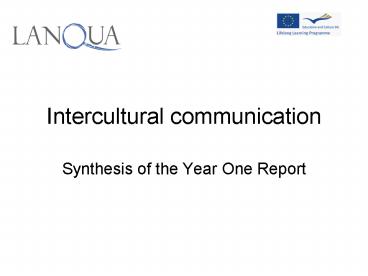Intercultural communication - PowerPoint PPT Presentation
1 / 19
Title:
Intercultural communication
Description:
Culture - the structured manifestation of human behaviour in social life within ... INCA Project: http://www.incaproject.org/tools.htm. 4. QA mechanisms ... – PowerPoint PPT presentation
Number of Views:78
Avg rating:3.0/5.0
Title: Intercultural communication
1
Intercultural communication
- Synthesis of the Year One Report
2
1. Definition
- Communication - the active relationship
established between people through language - Intercultural - communicative relationship
between people of different cultures - Culture - the structured manifestation of human
behaviour in social life within specific national
and local contexts political, linguistic,
economic, institutional, professional and so on.
3
- intercultural communication (linguistic
perspective ) - a situated communication between individuals or
groups of different linguistic and cultural
origins
4
- Focus
- the acquisition of skills and human attributes
likely to enhance intercultural communication is
reviewed exclusively as a component of language
programmes
5
- intercultural competence -
- knowledge
- skills
- attitudes
6
- 7 significant issues
- i) ICs relationship with language itself,
- ii) its integration into language teaching
pedagogy - iii) its identification or otherwise with
nationhood, - iv) its link with personal identity,
- v) the psychological principles underpinning the
formation of attitudes and stereotypes, - vi) the disciplinary structure of higher
education (HE) in different countries and
institutions, - vii) more general economic and cultural aspects
of academic environments, internal and external,
in which learning takes place.
7
- Intercultural communication
- content
- competence
8
- Content
- Autonomous courses theoretical, not necessarily
linked to languages - Cases of courses with
- theory, practice, relationships between
language-related aspects and language-independent
aspects
9
- Competence
- Knowledge of language(s) and of the context
- Skills to express oneself in language appropriate
to rhe context concerned - Attitudes to deploy these skills
10
- Intercultural competence is based on awareness
(for example of the difference between oneself
and others) - Identity /identification
- how to behave and how to interpret the behaviour
of others ?
11
2. Delivery
- an implicit element of most language courses
delivered in different European HE environments
or features as an autonomous subject in other
disciplinary fields
12
- as knowledge and a skill but also aims to promote
an appropriate attitude / awareness as an
integrated part of language learning - TaLLICo (Tandem Language Learning for
Intercultural Competence) Waterford Institute of
Technology - aims to promote meaningful intercultural dialogue
to improve language and intercultural skills
between Irish and visiting Erasmus students.
13
- associated with translation (as in Spain)
- associated with intercultural knowledge
dissemination (as in Århus). - degrees combining business studies or
organisational communication studies with foreign
languages - University of Southern Denmark and
Copenhagen Business School - Linguaggi del turismo e comunicazione
interculturale - University of Rome.
14
- Most interesting cases are normally on
specialised modern language degree courses which
have a professional focus.
15
3. Assessment / evaluation of students
- Distinction between knowledge, skills and
attitudes - Knowledge component can, strictly speaking, be
assessed in traditional ways. - Skills and attitudes need to be assessed in other
ways such as role-play, observation,
self-assessment or reflection on critical
incidents. Yet such assessment practices are not
widespread within European HE language
programmes. - Skills evaluated by project work - students have
to apply their theoretical knowledge to
particular communicative situations or conducting
small-scale ethnographic or case study research
(U.S. Denmark)
16
- - writing logbooks (UK)
- Interculture Project http//www.lancs.ac.uk/users/
interculture - LOLIPOP portfolio www.lolipop-portfolio.eu.
- INCA Project http//www.incaproject.org/tools.htm
.
17
4. QA mechanisms
- In all the countries, there are national quality
agencies but quality assessment in language
teaching/learning does not appear to be one of
their primary concerns. - Quality in intercultural communication in higher
education as well as school education should not
be reduced to ascertaining reliable methods for
assessments and direct evaluation, but by opening
up opportunities to students as well as teachers
to participate in relevant programmes.
18
- Perhaps the increase in numbers participating in
mobility could be a way of defining the quality
of language courses which are offering
intercultural communication as part of their
curriculum
19
- the role of the language teacher is to
develop skills, attitudes and awareness of values
just as much as to develop knowledge of a
particular culture or country - (Byram, Gripkova Starkey 2001)































